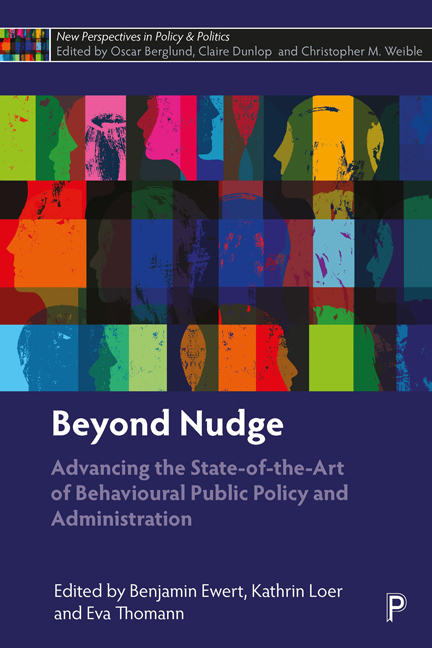Book contents
- Frontmatter
- Contents
- List of figures and tables
- Notes on contributors
- Acknowledgements
- 1 Beyond nudge: advancing the state-of-the-art of Behavioural Public Policy and Administration
- 2 Advancing behavioural public policies: in pursuit of a more comprehensive concept
- 3 A behavioural model of heuristics and biases in frontline policy implementation
- 4 Who are behavioural public policy experts and how are they organised globally?
- 5 Why nudge sometimes fails: fatalism and the problem of behaviour change
- 6 Behavioural insights teams in practice: nudge missions and methods on trial
- 7 Can street-level bureaucrats be nudged to increase effectiveness in welfare policy?
- 8 What motivates street-level bureaucrats to implement the reforms of elected politicians?
- 9 How can better monitoring, reporting and evaluation standards advance behavioural public policy?
- 10 Conclusion
- Index
1 - Beyond nudge: advancing the state-of-the-art of Behavioural Public Policy and Administration
Published online by Cambridge University Press: 28 March 2024
- Frontmatter
- Contents
- List of figures and tables
- Notes on contributors
- Acknowledgements
- 1 Beyond nudge: advancing the state-of-the-art of Behavioural Public Policy and Administration
- 2 Advancing behavioural public policies: in pursuit of a more comprehensive concept
- 3 A behavioural model of heuristics and biases in frontline policy implementation
- 4 Who are behavioural public policy experts and how are they organised globally?
- 5 Why nudge sometimes fails: fatalism and the problem of behaviour change
- 6 Behavioural insights teams in practice: nudge missions and methods on trial
- 7 Can street-level bureaucrats be nudged to increase effectiveness in welfare policy?
- 8 What motivates street-level bureaucrats to implement the reforms of elected politicians?
- 9 How can better monitoring, reporting and evaluation standards advance behavioural public policy?
- 10 Conclusion
- Index
Summary
Introduction
Under the headings of ‘Behavioural Public Policy’ (BPP) and ‘Behavioural Public Administration’ (BPA), insights about psychological micro-mechanisms increasingly inform the study, design, and implementation of public policy. While BPP generally refers to interventions that are ‘directly inspired by, and designed on, the principles of behavioral research’ (Galizzi 2014: 27), BPA is defined more specifically as the ‘analysis of public administration from the micro-level perspective of individual behavior’ (Grimmelikhujsen et al 2017: 45; Tummers 2020). Gofen et al (2021: 633) propose the overarching term ‘behavioural governance’ to capture ‘the cognitive and decision processes through which decision-makers, implementing actors and target populations shape and react to public policies and to each other, as well as the impacts of these processes on individual and group behaviour’.
Behavioural interventions are often claimed to be far more than just another tool in the policy toolbox. Instead, they are deemed as an innovative approach to reassess policy making and public administration as a whole. Behavioural interventions and respective analytic perspectives shift the focus of public policy and its implementation to the individual level – behavioural policies are influenced by behavioural science and aimed at changing the individual’s behaviour in a certain situation. By contrast, and perhaps because of this micro-level focus, in many ways the potential of applying behavioural insights throughout the policy process has not yet been fully exploited. Seeking to contribute to filling this gap, this book (emanating from a themed issue in Policy & Politics) features theoretical, methodological, and empirical advancements of the state-of-the-art of BPP and BPA.
Since the early 2000s, BPP and BPA have attracted much political and scientific attention nearly all over the world, and are sometimes presented as an ultimate panacea. At the same time, limitations to behavioural approaches have become evident. For example, behavioural approaches have yet to be applied to more complex problems, rather than merely focusing on ‘low hanging fruits’ (Hansen 2018: 195). Related questions are how behavioural policies and individual-level behaviour translate into policy and social outcomes and to what extent micro-level behavioural insights are accountable to those changes at the meso and macro level of the political system (Jilke et al 2019).
- Type
- Chapter
- Information
- Beyond NudgeAdvancing the State-of-the-Art of Behavioural Public Policy and Administration, pp. 1 - 15Publisher: Bristol University PressPrint publication year: 2023

